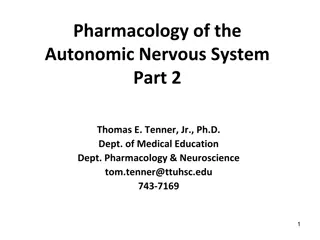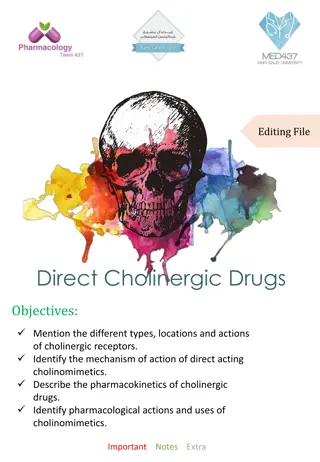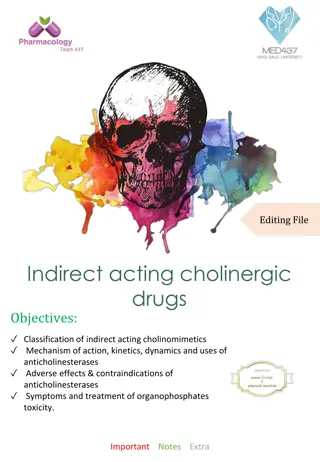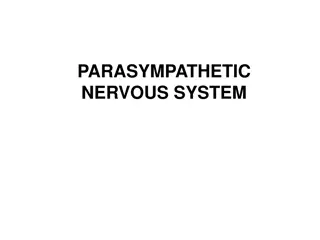Indirect-Acting Cholinergic Drug
Explore the classification, mechanism of action, and pharmacological effects of indirect-acting cholinergic drugs such as anticholinesterases. Learn about the importance, main uses, adverse effects, and contraindications of these drugs. Discover how anticholinesterases increase acetylcholine concent
1 views • 16 slides
Pharmacology of the Autonomic Nervous System Part 2 Summary and Learning Objectives
Explore the pharmacology of the autonomic nervous system focusing on cholinergic and adrenergic agents. Learn about cholinomimetics, direct and indirect acting cholinergic agonists, their therapeutic indications, and adverse effects. Discover the mechanism of action and uses of nicotinic agonists. D
1 views • 44 slides
Understanding Cholinergic Drugs: Receptors, Actions, and Pharmacology
Learn about the types, locations, and actions of cholinergic receptors, the mechanism of action of direct-acting cholinomimetics, pharmacokinetics of cholinergic drugs, and the pharmacological actions and uses of cholinomimetics. Explore the roles of nicotinic and muscarinic receptors in the nervous
5 views • 12 slides
Understanding Indirect-Acting Cholinergic Drugs and Their Mechanisms of Action
This lecture covers the classification, mechanism of action, kinetics, dynamics, and uses of indirect-acting cholinomimetics. It discusses anticholinesterases, their adverse effects, contraindications, and the symptoms and treatment of organophosphates toxicity. Reversible and irreversible anticholi
2 views • 24 slides
Understanding Indirect Acting Cholinergic Drugs: Mechanism, Classification, and Clinical Applications
Explore the world of indirect acting cholinergic drugs, also known as anticholinesterases, which work by inhibiting acetylcholinesterase to increase acetylcholine levels at cholinergic receptors. Learn about their mechanisms of action, classification, kinetics, dynamics, uses, adverse effects, contr
1 views • 10 slides
Understanding Cholinergic Neurons and Agonists in Pharmacology
Cholinergic neurons play a vital role in neurotransmission by utilizing acetylcholine (ACh) as a neurotransmitter. This neurotransmission involves steps like synthesis, storage in vesicles, release, receptor binding, degradation, and recycling of choline and acetate. Choline acetyltransferase cataly
0 views • 30 slides
Understanding the Parasympathetic Nervous System and Cholinergic Pharmacology
Dive into the world of the parasympathetic nervous system and cholinergic pharmacology, exploring concepts like cholinomimetics, parasympathomimetics, cholinolytics, and more. Discover how acetylcholine synthesis and degradation play crucial roles in these processes, and learn about different cholin
1 views • 27 slides
Understanding Cholinergic Transmission in Neurohumoral Signaling
Cholinergic transmission plays a crucial role in neurohumoral signaling, involving the release of acetylcholine at synapses and neuroeffector junctions. Dr. Rashmi Rekha Kumari explains the synthesis, storage, release, and catabolism of acetylcholine, highlighting the role of choline acetyl transfer
0 views • 11 slides
Understanding Pharmacology: Introduction to Neurotransmitters and Nervous System
This content delves into the fundamentals of neuropharmacology, exploring concepts such as dose-response curves, afferent and efferent neurons, peripheral nervous system divisions, neurotransmitter functions, and neurochemical classifications. It covers the roles of cholinergic, adrenergic, and dopa
0 views • 29 slides
Understanding the Cholinergic System and Cholinergic Drugs
The cholinergic system plays a crucial role in the transmission of signals within the nervous system. Acetylcholine (ACh) is the primary neurotransmitter involved in cholinergic transmission, impacting various physiological functions. Cholinergic neurons synthesize ACh through a complex process invo
0 views • 43 slides
Understanding Dementia and Alzheimer's Disease Management
Dementia and Alzheimer's Disease are significant health challenges with under-diagnosis and under-treatment issues. The prevalence of Alzheimer's is high, leading to a substantial societal cost. The natural history of Alzheimer's shows a progression of symptoms over time, with cholinergic dysfunctio
0 views • 37 slides










